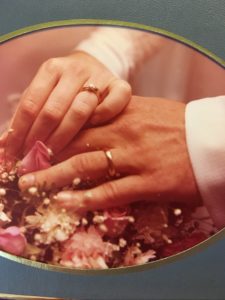I’ve read a handful of books on grief, widowhood, and related topics the past 18 months. One book, Two-Part Invention by Madeleine L’Engle, intertwines the story of her marriage and the story of her husband’s death. She touches on something that I imagine most widows face, and that’s how to talk about the past and the present in terms that make sense. She wrote this in her husband’s last days:
“But if Hugh dies first, would I ever be able to stop saying “we” and say “I”? I doubt it. I do not think that death can take away the fact that Hugh and I are “we” and “us”, a new creature born at the time of our marriage vows, which has grown along with us as our marriage has grown.”
I find myself struggling when I talk to people who don’t really know me yet. I think when I say “we” I confuse them. So much of my life has been, and always will be “we”. But, so many times it’s just not the right time to tell the whole story. And If I just say, “My husband passed away in 2020, (I just realized I can no longer say “last year” as it’s another calendar year now) they are often left in an uncomfortable position. They always say, “I’m so sorry,” but then there is this awkward silence. I just say “Thank-you.” Sometimes I tell a little more; sometimes I want to ask if the person has 2-3 hours to listen to all the details. Just to tell it one more time. But, I don’t.
And I really don’t like being introduced as the woman who lost her husband, which has happened several times. I’d rather tell people on my own terms, in my own time, in my own way.
So, yes, I’ll always be a part of “we” and, but I’m also “I”. I’m still working on that, though.


